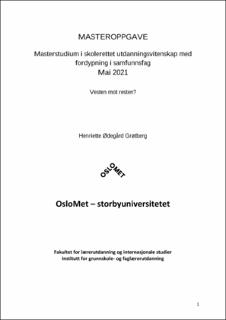Vesten mot resten? Kan lærebøkene åpne eller lukke for kritisk tenkning i samfunnsfag?
Master thesis
Published version
Permanent lenke
https://hdl.handle.net/11250/2789401Utgivelsesdato
2021Metadata
Vis full innførselSamlinger
Sammendrag
Mennesker har fortalt sanne og fantasifulle historier om og for hverandre i 70 000 år. Vi forteller historier for å tilegne oss kunnskap, og bare for å underholde og skape samhold. Men det kan være svært viktig å klare å skille de sanne fra de usanne fortellingene, særlig i historiefaget. Og kanskje aller viktigst er det å lære fremtidens samfunnsborgere hvordan de kan skille disse fra hverandre, og hvorfor. Konsekvensen av å ikke være kritisk til de historiske oppfatningene og forestillingene om verden og historien, kan være fatale. Derfor er kompetansen kritisk tenkning så viktig som en del av skolens danningsmandat. Denne undersøkelser forsøker å belyse om lærebøkene i samfunnsfag kan bidra til å åpne historieundervisningen for kritisk tenkning, slik at skolen kan komme i mål med å danne aktive, selvstendige og kritisk tenkende fremtidige samfunnsborgere. Motsatt vil undersøkelsen også forsøke å avsløre om lærebøkene lukker historieundervisningen og dermed hindrer skolen i å danne fremtidens kritisk tenkende samfunnsborgere. For å avgrense oppgaven til et smalere undersøkelsesområde tar denne oppgaven utgangspunkt i hvordan lærebøkene foreller om Vesten i temaene styresett, avkolonisering og Midtøsten. På denne måten ville det innsamlede datamaterialet gjennom kvalitativ tekstanalyse gi mulighet for å gi et dypere svar på problemstillingen. Undersøkelsen viser at fortellingen om styresett, avkolonisering og Midtøsten både bidrar til å åpne undervisningen for kritisk tenkning, men også lukke den. Men de historiske fortellingene åpner og lukker for kritisk tenkning på ulike måter. Humans have been telling true and imaginative stories about and for each other for 70,000 years. We tell stories to acquire knowledge, and to entertain and create unity. But it can be very important to be able to distinguish the true from the untrue stories, especially in the subject of history. And perhaps most importantly, it is to teach the citizens of the future how to separate them from each other, and why. The consequence of not being critical of the historical perceptions and notions of the world and history can be fatal. It's called critical thinking. That is why the competence in critical thinking is important as part of the school's educational mandate. This research seeks to shed light on whether the textbooks in social studies can help to open the teaching of history to critical thinking, so that the school can reach the goal of forming active, independent and critically thinking future citizens. Conversely, the survey will also try to reveal whether the textbooks close history teaching and thus prevent the school from forming future critically thinking citizens. In order to limit the thesis to a narrower area of study, this thesis is based on how the textbooks differ about the West in the themes of governance, decolonization and the Middle East. In this way, the collected data material through qualitative text analysis would provide an opportunity to provide a deeper answer to the problem. The study shows that the narrative of governance, decolonization and the Middle East both helps to open the teaching for critical thinking, but also to close it. But the historical narratives open and close for critical thinking in various ways.
